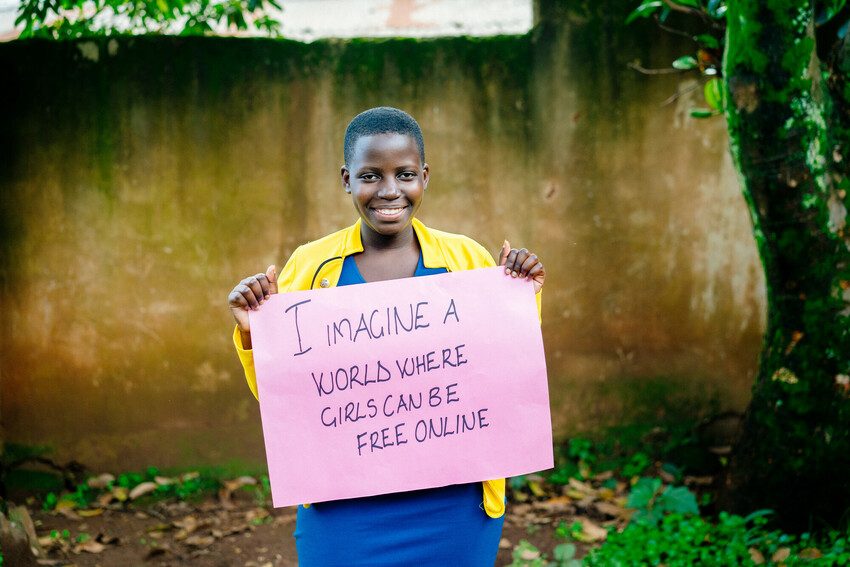Uganda home
Plan International started working in Uganda in 1992. Since then we have worked alongside communities on many different issues to improve millions of childre…
Frequently asked questions and answers to help you understand more about the Girls Get Equal campaign in Uganda.

Girls Get Equal is Plan International’s girl-led campaign to advance gender equality.
Currently the campaign is active in over 60 countries.
Instead of focusing on a single issue, such as girls’ education, the campaign aims to change the way girls are valued in society so they no longer have to face injustice, oppression, discrimination or stereotypes that hold them back.
The Girls Get Equal campaign offers a real opportunity to drive lasting change for girls’ rights and equality, and to bring transformative change not only for girls but contribute to national development.
Regardless of who the girls are, where they live or who they regard as kin, Ugandan girls want to be able to access, exercise and enjoy their human rights free of fear and exclusion.
The campaign was launched in Uganda in 2019 by the Speaker of Parliament, Rt Hon Rebecca Alitwala Kadaga.
The national launch was preceded by events in the districts of Kamuli, Tororo, Lira, Adjumani, Yumbe, Arua and Nebbi.
At the events, girls in each area had the opportunity to raise issues that hold them back from equality. In response, various decision-makers made commitments to address these issues and support the Girls Get Equal campaign.
Plan International and partners call upon the public to stand up for young women and girls’ equality by ensuring that:
Girls and women are at the forefront of the campaign however, to advance gender equality, we also need the engagement of the following groups:
Uganda is a predominantly patriarchal society which prevents girls from taking the lead in their lives and communities, as well as exercising their rights.
Economic, social, political and cultural power is generally held by men, limiting the influence girls can have in decision-making.
To challenge the status quo and push for change, boys and men need to realise the potential of girls and recognise the benefits of gender equality.
In many Ugandan communities, when girls are born, their families are said to have got ‘sugar’, meaning she will be exchanged for property in the future. However, when a boy is born, he is celebrated as the heir of the family and held in high esteem.
In many homes, girls are expected to carry out many of the domestic chores and are more likely than boys to be pulled out of school due to the assumption they will be married off.
As a result, girls’ lives are impacted, and they have fewer opportunities to benefit from education, leadership and economic empowerment.
Therefore, girls want to be equal because they are tired of being abused, discriminated, stereotyped and marginalised. They want to equally contribute to and benefit from society.
Yes!
In an equal society, there shouldn’t be roles designed just for men or women. This means that women and girls should also have opportunities to do activities that are stereotypically for men.
Not all girls in Uganda are aware of the need to be equal.
For some girls, culture and/or religion has taught them to accept and regard themselves as lesser beings compared to boys or men.
They have watched sisters, friends, mothers, aunties and grandmothers being treated in this way and they may not know any other way.
As such, some girls, especially in rural settings, reinforce the harmful social norms and practices that hold them back.
Girls Get Equal will give girls a voice and power to hold decision-makers to account to ensure their rights are realised.
Plan International Uganda values boys and men as key allies in the movement for gender equality and the empowerment of women and girls. Men must be engaged so they champion the cause of equality.
By engaging men as allies Plan International Uganda will raise their awareness of gender equality and the empowerment of girls.
Plan International Uganda will not use boys or men. We will empower them to appreciate the need for equality, uphold the rights of girls and demand girls are treated as equal citizens
When girls are valued and treated equally without any form of discrimination, they will make informed decisions on when and who to marry.
Ideally, couples in relationships who are aware of the benefits of equality will treat each other with mutual respect.
Empowering women should not be viewed as a threat but as an opportunity to create strong female leaders within families and communities.
No. Power is one of the demands of the campaign, however it is not about overpowering men. Girls’ demand for power is about influencers and decision-makers creating space and opportunities for girls and young women to equally participate in leadership and decision-making processes especially regarding issues that directly impact their lives.
It is also about challenging and dismantling oppressive patriarchal systems, gender norms and stereotypes that promote inequality between girls and boys.
It is about igniting conversations between boys and girls, men and women to help them realise the benefits of sharing power.